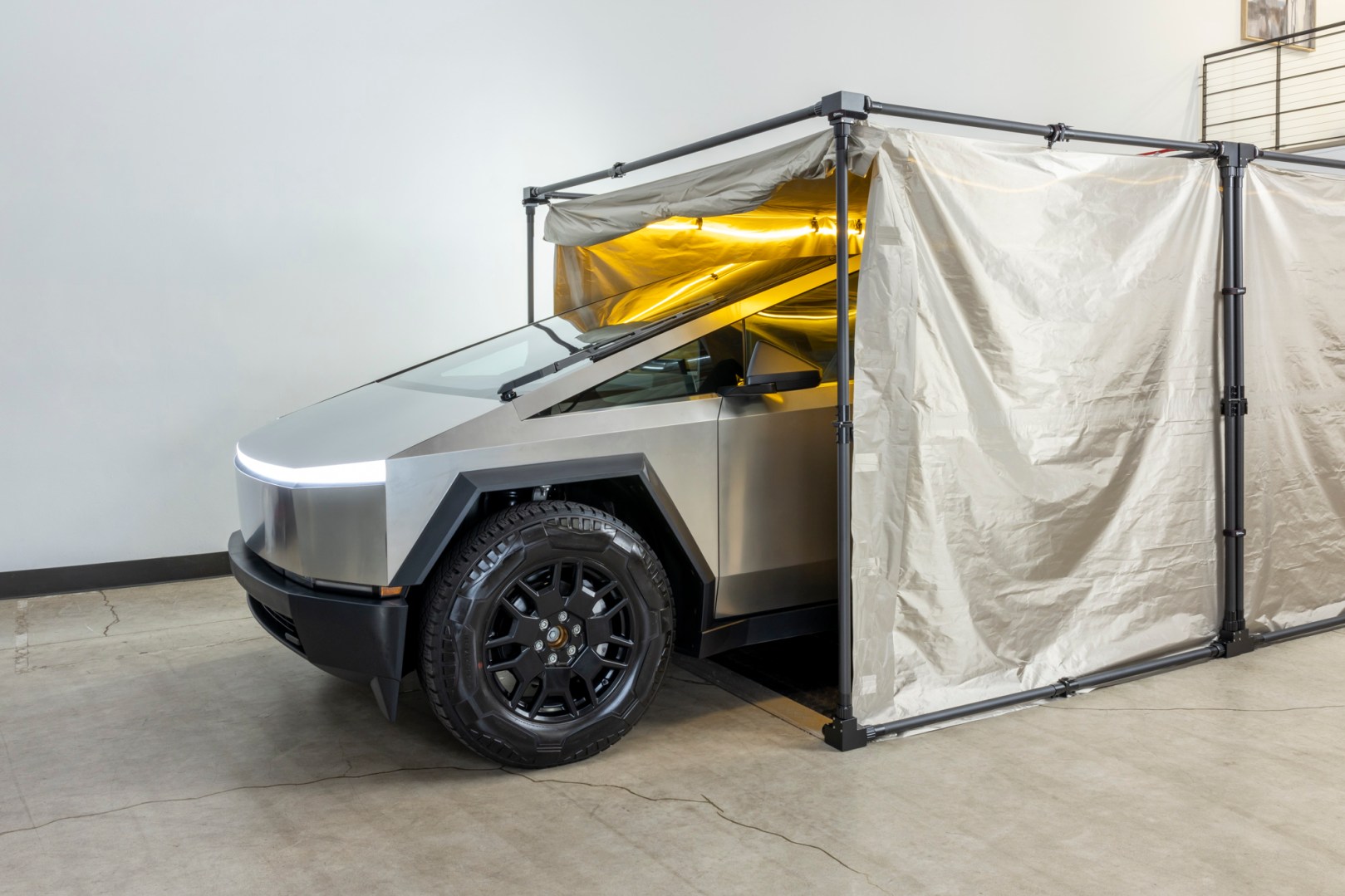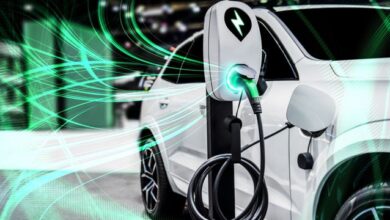This Cybertruck doomsday tent shields from EMP attacks

The daily barrage of negative news about international conflicts makes the world seem like an increasingly volatile powder keg.
Regional wars are flaring up, threatening to spill into major global conflagrations. What’s also true is that these brutal fights are both ageless in their horror and extremely modern, utilizing a whole host of new technologies that can affect people across unprecedented distances.
One such serious contemporary threat would be an EMP attack that targets a country’s infrastructure, knocking out its electricity, internet, and other crucial systems.
A pioneering company, Mission Darkness, has introduced products that could protect equipment against such calamities, recently creating a so-called CYBERCYLENT Faraday tent to offer military-grade protection from EMP events for vehicles like Tesla’s Cybertruck.
What’s an EMP attack?
According to the US Cybersecurity and Infrastructure Security Agency, an Electromagnetic Pulse (EMP) attack “could damage significant portions of the Nation’s critical infrastructure, including the electrical grid, communications equipment, water and wastewater systems, and transportation modes.”
What’s more, the effects of such an attack could snowball, starting in one critical sector and moving on to others, growing from the geographic area where it hit to affect millions of people and businesses.
What are the most likely ways for such an attack to unfold? One of the worst possibilities would be a high-altitude nuclear detonation — an explosion of a nuclear weapon that could permanently turn off huge chunks of a nation’s electrical grid and other key infrastructure. Specialized conventional munitions or non-nuclear directed energy devices could also be used.
It’s worth noting that a so-called GMD event, a naturally occurring geomagnetic disturbance caused by severe space weather, could also produce effects similar to an EMP attack.
A GMD event could be a product of a coronal mass ejection on the Sun, damaging the Earth’s electrical grids, satellites, navigational systems, and other electronics.

How real are EMP threats?
Interesting Engineering corresponded with Mission Darkness CEO Ryan Judy, who founded Mission Darkness in 2015 and has grown it to provide digital forensics equipment like Faraday bags and radio-frequency-shielded lockers to law enforcement agencies.
As digital evidence collection is now part of almost every criminal investigation, the company’s products safeguard such evidence (like a cellphone) against hackers or anyone attempting to impact it remotely.
The company’s CYBERCYLENT Faraday tent takes this kind of protection step further, looking to protect a whole car like the Cybertruck against EMP or similar threats. The cover would work on other similar vehicles as well, but given the popularity of the Cybertruck, Mission Darkness calls the tent “the Doomsday Cover for the Ultimate Doomsday Vehicle.”
When asked how seriously we should take EMP threats, Ryan Judy elaborated that it’s hard to have any certainty in predicting the likelihood of an EMP event. But if you look at the world today, it’s not hard to imagine such an outcome is quite possible.
“The recent conflict between Israel and Iran has prompted articles suggesting that both sides possess EMP weapons and may consider using them,” he wrote, adding “various sources have reported on Russia’s potential deployment of EMPs against the United States.” He also referred back to the wayward Chinese high-altitude balloon incident that some said could have had an EMP weapon.
Why would anyone want to use this kind of weapon?
Ryan believes it presents certain strategic advantages. “By disabling power systems, communication networks, transportation infrastructure, and other critical systems, an EMP attack can immediately paralyze a society without causing immediate loss of life,” he said.
He thinks the chaos and breakdown of society will likely lead to serious casualties as time passes. Ryan stated that “this method allows the aggressor to maintain a facade of innocence regarding direct fatalities, making it an attractive option for those seeking to cause disruption without overtly crossing the line into mass murder.”
A version of this scenario was illustrated in the recent Netflix hit “Leave the World Behind,” in which a “Fire Sale” cyberattack similarly destroyed the crucial services of modern life.
How can you protect your car from EMPs?
The approach behind Mission Darkness’s CYBERCYLENT tent would apply to other devices that need protection from EMPs.
The tent uses specialized material and construction techniques while employing the principles of a Faraday cage — essentially building an enclosure that blocks out certain electromagnetic fields.
More specifically, the CYBERCYLENT Faraday tent utilizes the TitanRF Faraday fabric of metalized fibers, which is highly conductive, playing a key role in protecting EMPs. The fibers in the fabric can conduct electricity and create an electromagnetic shield.
If an EMP hit the tent, the fabric would redistribute the electrical charge along the tent’s exterior. Doing so cancels out the electromagnetic fields inside. This process creates a barrier that prevents electromagnetic waves from entering the interior, protecting whatever devices are stored there.
The tent blocks a wide spectrum of RF signals, including WiFi, Bluetooth, cell signals (5G), GPS, RFID, NFC, and radio signals ranging from low MHz to 40GHz.
As Ryan Judy explained, the CYBERCYLENT Faraday tent’s design creates a continuous conductive barrier surrounding the items to be protected.
“The precision in its construction ensures there are no gaps, seams, or unshielded openings that could allow electromagnetic waves to penetrate,” he shared. This kind of full enclosure is key in ensuring an effective block against an EMP threat.
Another aspect of its quality and construction that makes the tent well-suited for this task is the attenuation it provides, reducing the strength of the electromagnetic waves.
As Judy wrote, “the fabric’s properties have been lab-tested to meet MIL-STD-188-125 standards, ensuring that the tent provides military-grade protection,” adding, “this rigorous testing confirms that the tent can effectively reduce the impact of an EMP on electronic devices inside.”
Not just for the Cybertruck
This kind of protection is not just for Tesla’s Cybertrack owners — the CYBERCYLENT Faraday tent would work with just about any vehicle, electric or powered by gas.
The Mission Darkness team is highlighting its use for the Cybertruck because, as Judy called it – the Cybertruck is “as armored as a production vehicle can get,” featuring a 6-foot bed, 220V outlets, and the ability to be recharged with solar panels.
This makes it a particularly good choice for survival in hard, post-EMP conditions where traditional fuel would be difficult to come by.
Ryan recommends that electric vehicle owners store a supply of solar panels in the tent next to the vehicle. When gas runs out, the Sun can still provide endless energy, keeping your vehicle running. Imagine Mad Max but with electric vehicles instead.
How quickly can the EMP cover be installed?
It doesn’t take long to set up a CYBERCYLENT tent—just about 30 minutes. Mission Darkness designs all the connectors and poles in-house and conforms everything to ensure the product is easily assembled. The durable components come together quickly, followed by the attachment of the tent liner.
As Judy also wrote, the tent is very portable. Depending on your size, it would come in two or three rolling hard cases, ready to be transported.
This is largely due also to the fact that unlike other tent products on the market that rely on steel or aluminum poles, the CYBERCYLENT tent’s poles are made of carbon fiber. This reduces the tent’s weight considerably, making moving much easier.
Are you ready to pick one up? The company’s intro of the tent states on its website, “The use of an EMP-resistant car cover is a practical decision for forward-thinking individuals (not just doomsday preppers) to ensure their vehicles maintain functionality in an EMP-related event.”
ABOUT THE EDITOR
Paul Ratner Paul Ratner is a writer, screenwriter, and educator. He has written for years for Big Think, Huffington Post and other publications, focusing on stories of paradigm shifts in science, technology and history. Paul is also an award-winning filmmaker, holding an MFA from Chapman University and a BA from Cornell University. Paul lives in sunny Sarasota, Florida.



